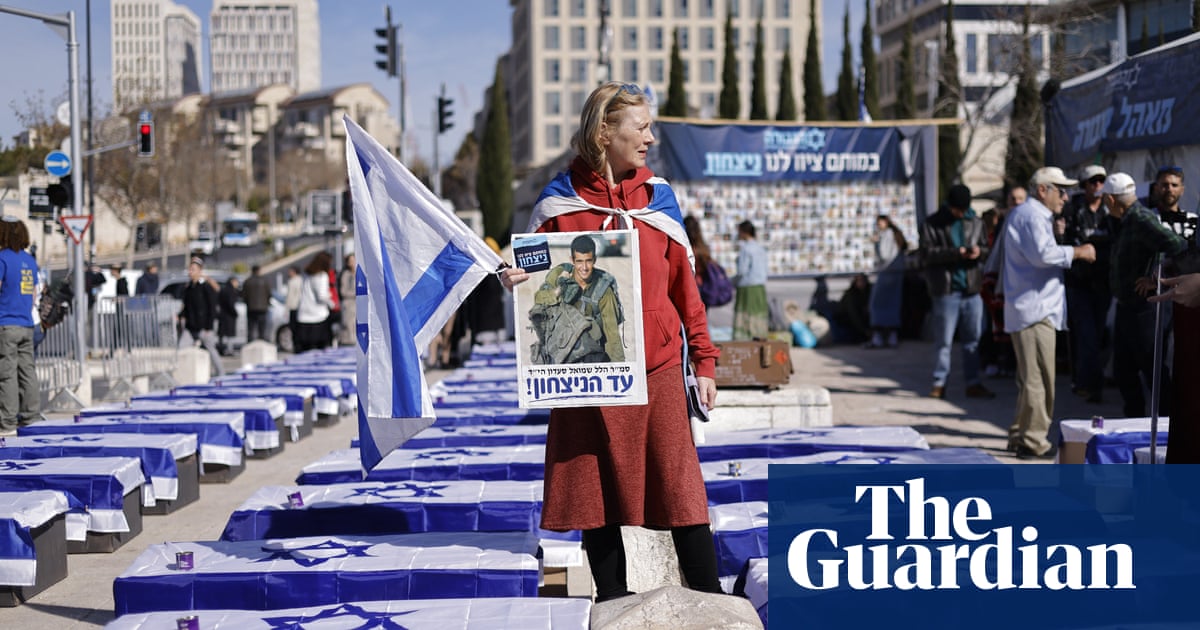‘A mix of emotions’: Hamas deal seen as a betrayal but greeted with joy by Palestinians

News of a ceasefire and hostage release deal between Israel and Hamas has been greeted with joy by Palestinians, but a more wary approach in Israel, where demonstrators both in favour and against the deal have taken to the streets.
The deal, which is supposed to go into effect on Sunday, is made up of three stages: in the first 42-day phase, 33 Israeli hostages are expected to be released in exchange for hundreds of Palestinians held in Israeli jails. In Gaza, the 2.3 million population – nearly all of whom are displaced from their homes – will be allowed to move freely around the territory, and there is expected to be a huge increase in aid supplies.
Israel’s stated objectives in the 15-month war in Gaza, which was triggered by the Hamas attack of 7 October 2023, are to completely destroy the Palestinian group, and to bring the remaining 100 or so hostages home. For many, the compromises made this week in Qatar to get the deal over the line are seen as a betrayal, but for differing reasons.
At Hostage Square, a plaza outside the Tel Aviv Museum of Art, a few hundred friends and relatives of the hostages met on Thursday night for a sombre gathering and music played by friends of 25-year-old Evyatar David, who was taken captive at the Nova music festival.
Volunteers ran stalls giving out pitta sandwiches and neon T-shirts reading: “You are not alone.” On posters of the hostages, ages had been crossed out and updated – in some cases not once, but twice, after two birthdays in captivity.
The mood was tense. Many people held hands and sat or stood in silence, contemplating what the next few days would bring.
“It’s a mix of emotions,” said Matan Eshet, 27, David’s cousin. “Of course we are really glad that people are coming back home, but on the other hand, we don’t know their condition. And Evyatar is not on the first list. We are anxious because every day he stays there, he is in danger.
“A year ago, we had a big push to mark 100 days, and I thought, surely this will end soon. There is still a lot that can go wrong.”
Supporter Andrea, a 54-year-old from Tel Aviv, said that friends abroad had messaged and called to express excitement and relief at the deal, and she was afraid to dampen their spirits.
“It’s good, but it’s not good, at the same time. It’s hard to explain to people who are not here that it’s only partial, and some people may get left behind,” she said.
Meanwhile in Jerusalem, about 1,500 people protested against the deal outside the prime minister, Benjamin Netanyahu’s office, blocking a nearby highway, and were dispersed by police.
Many wore black, and had red paint on their hands, bearing placards saying: “A released prisoner today is a terrorist tomorrow,” and: “You have no mandate to surrender to Hamas.” Earlier in the day, about 40 coffins draped in Israeli flags were placed outside.
The demonstration was led by relatives of hostages in the Tikva Forum, a smaller group which favours total military victory against Hamas over diplomacy, and the pro-settlement Nachala organisation. The major talking point was the same as at the pro-deal demonstration in Tel Aviv: that the agreement brokered this week could effectively abandon some of the hostages.
Shmuel, 27, said: “We are against a deal like this. I’m not demonstrating against the families but against the government. It’s forbidden for a country to be run by the emotions of families. The families have the right to do whatever they think will bring their family members, but as a country, we can’t put in danger the security of the whole state.”
Shmuel said that he had served more than 400 days of reserve duty since the war began, away from his three children, and that he felt the government was in danger of wasting the army’s efforts.
“We need to continue this war … My best friend died a month ago [fighting] in Rafah. I ask myself now if it was for nothing,” he added.
Eshet said he understood why some people in Israel were against the deal.
“They have lost loved ones, they’ve made huge sacrifices. I just hope they can see that doing a deal doesn’t disrespect them. This war started because of the hostages, they are the most important thing. And people coming back from hell is a good thing.”
Related
Qatar emphasizes importance of reaching agreement between US, Iran
CAIROQatar's Prime Minister Sheikh Mohammed bin Abdulrahman Al-Thani stressed the critical need for an agreement between the US and
International Women’s Day: Seeking a Balance with Ghada Al Subaey
1309’s Ghada Al Subaey of Qatar celebrates the many layers of femininity in her recent drop, called Labyrinth of Light. This International Women’s Day, the
Discover Ooredoo Plans and Services in Qatar
Ooredoo is the household name in the field of telecommunications and provides a full portfolio of telecom services: mobile plans for everyone, home
What Will The Imminent Qatar Airways Widebody Order Include?
Which Airline Alliance Do You Prefer To Fly With?












